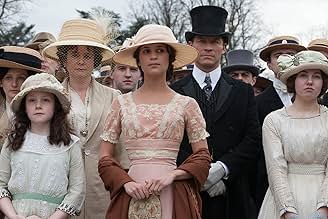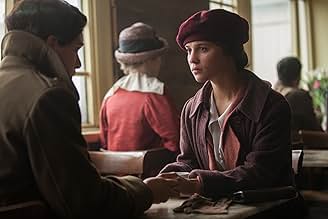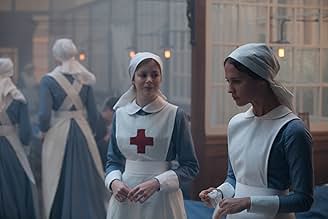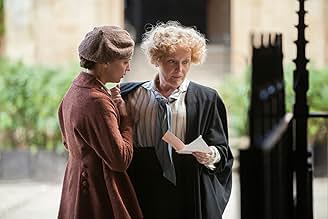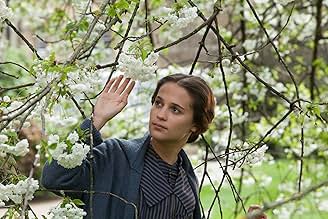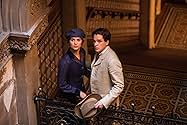VALUTAZIONE IMDb
7,2/10
31.428
LA TUA VALUTAZIONE
Una donna britannica ricorda la gioventù durante la prima guerra mondiale: una storia d'amore, la futilità della guerra e come dare un senso ai tempi più brutti.Una donna britannica ricorda la gioventù durante la prima guerra mondiale: una storia d'amore, la futilità della guerra e come dare un senso ai tempi più brutti.Una donna britannica ricorda la gioventù durante la prima guerra mondiale: una storia d'amore, la futilità della guerra e come dare un senso ai tempi più brutti.
- Regia
- Sceneggiatura
- Star
- Premi
- 5 vittorie e 7 candidature totali
Recensioni in evidenza
I remember being given this book as a set text for an English A-Level examination over 30 years ago and am aware that there was a prestigious BBC production of it also several years back but this is the first dramatisation I've seen of Vera Brittain's novel documenting her own experiences in that golden age of post-Edwardian pre WW1 England when for coming-of-age birthdays you got given a piano from your father. That's if you were a girl of course, her more musically gifted brother conversely gets what she would have wanted, a scholarship at Oxford although on the other hand he is also at the the prime age to be called up for what he and most everyone else (but not their knowing father) believes will be a short, heroic and clean war which of course it turned out not to be (apart from the heroic part).
Young Vera is headstrong, not only about wanting to make her own way in a man's world (female emancipation was still years away), but later about making her own contribution to the war effort by enrolling as a nurse while her lover, brother and other male friends are fighting in the trenches. Told wholly from her point of view, it's an entertaining if not enthralling watch, beautifully shot and well acted if somehow just lacking some extra pathos to really capture the hellish undertow of the War to end all Wars.
Alicia Vikander is appealing as the vaguely tomboyish, intellectual Vera. In those days, it would appear, the golden youth had to be chaperoned everywhere by a usually imposing maiden aunt figure and make their feelings about each other known by writing and sending poems as the film strives to contrast the idyllic pre-war days of carefree swimming and carousing with the bleakness and destruction of war itself. For me, I didn't feel the contrast quite sharply enough and my abiding memories of the film are of the big family house and the dreaming spires of Oxford rather than the hell of the makeshift military hospitals and muddy and bloody trenches on the front line.
The best shot for me was when I perhaps detected a tribute to all-time great movie "Gone With The Wind" as Vera goes Scarlett-like amongst the wounded and dying, searching for her wounded brother where the camera ascends into a sweeping dolly shot showing the full extent of the number of the casualties, just like Vincent Fleming's rightly famous take all those years ago.
The supporting actors are picked from the familiar directory of experienced British character actors, notably Miranda Richardson and Emily Watson, while the young actors in the leads, all of them unfamiliar to me, perform with aplomb.
There is a great true-life story to be told here and this film does so respectfully and responsibly, if just a little too carefully at times.
Young Vera is headstrong, not only about wanting to make her own way in a man's world (female emancipation was still years away), but later about making her own contribution to the war effort by enrolling as a nurse while her lover, brother and other male friends are fighting in the trenches. Told wholly from her point of view, it's an entertaining if not enthralling watch, beautifully shot and well acted if somehow just lacking some extra pathos to really capture the hellish undertow of the War to end all Wars.
Alicia Vikander is appealing as the vaguely tomboyish, intellectual Vera. In those days, it would appear, the golden youth had to be chaperoned everywhere by a usually imposing maiden aunt figure and make their feelings about each other known by writing and sending poems as the film strives to contrast the idyllic pre-war days of carefree swimming and carousing with the bleakness and destruction of war itself. For me, I didn't feel the contrast quite sharply enough and my abiding memories of the film are of the big family house and the dreaming spires of Oxford rather than the hell of the makeshift military hospitals and muddy and bloody trenches on the front line.
The best shot for me was when I perhaps detected a tribute to all-time great movie "Gone With The Wind" as Vera goes Scarlett-like amongst the wounded and dying, searching for her wounded brother where the camera ascends into a sweeping dolly shot showing the full extent of the number of the casualties, just like Vincent Fleming's rightly famous take all those years ago.
The supporting actors are picked from the familiar directory of experienced British character actors, notably Miranda Richardson and Emily Watson, while the young actors in the leads, all of them unfamiliar to me, perform with aplomb.
There is a great true-life story to be told here and this film does so respectfully and responsibly, if just a little too carefully at times.
Vera Brittain (Alicia Vikander) wants to go to Oxford but her parents (Dominic West, Emily Watson) wants her to look for a husband. Her brother Edward (Taron Egerton), and friends Victor Richardson (Colin Morgan) and Roland Leighton (Kit Harington) all adore her. Vera falls for Roland and gets accepted to Somerville College, Oxford. As WWI approaches, her guys all volunteer. She convinces her father to let Edward enlist. She defers college and volunteers to be a nurse.
It has a slow period-piece start. It's got a nice hazy moody feel. Vikander is great but the guys need more exposition. They don't have enough space to show their characters. It's a slow burn and it's all concentrated on Vikander. She wins me over slowly. She has great sadness. It has very poignant moments especially in the later parts.
It has a slow period-piece start. It's got a nice hazy moody feel. Vikander is great but the guys need more exposition. They don't have enough space to show their characters. It's a slow burn and it's all concentrated on Vikander. She wins me over slowly. She has great sadness. It has very poignant moments especially in the later parts.
Considered one of the greatest war memoirs ever written, the Testament of Youth is a true-life account of Vera Brittian's life from 1914 - 1918, and a chronicle of how the First World War affected not only her, but the nation's lives.
One of the things that determines Testament of Youth different to other bloody, explosive and bullet-ridden war tales is that it is focused on the domestic view of the ones who not only joined the war on the front-line, but also those at home and the consequent effects on loved ones, offering an unseen perspective, and solid-account of the despair that war causes.
Beginning in pre-war 1914, we are introduced to Vera Brittain, a determined and wilful individual with aspirations of not becoming just a traditional young-married women, but one who attends Oxford University and chooses her own life-choices.
Along with her brother Edward (Taron Egerton) and his two friends Victor (Colin Morgan) and Geoffrey (Jonathan Bailey), they all enjoy their youth in the rural village with their parents (Dominic West and Emily Fox). On-the-road to Oxford, she is introduced to her brothers close friend Roland (Kit Harington), and a relationship soon breaks out - but untimely, as does the war.
Quite proud to do so out of loyalty to Queen and country, her brother Edward, and friends Victor and Geoffrey with Roland all sign up to the forces to assist. (Against parental wishes to do so). Now at Oxford, yet unable to focus as this devastation is happening all around her, she joins the forces too, as a nurse - and the film develops from there.
Given a world-premiere at the 58th BFI London Film Festival, the film is squeezed out in time for the Remembrance holidays and by-all accounts award season. Based on our criticism alone, it is going to be praised and remembered at both.
Crafted by former TV-movie director, James Kent, along with the (brilliant) cast, Testament of Youth is a thoroughly engaging history drama in Downton Abbey-esqe war times and a unique approach to the war like never before.
One of the things that determines Testament of Youth different to other bloody, explosive and bullet-ridden war tales is that it is focused on the domestic view of the ones who not only joined the war on the front-line, but also those at home and the consequent effects on loved ones, offering an unseen perspective, and solid-account of the despair that war causes.
Beginning in pre-war 1914, we are introduced to Vera Brittain, a determined and wilful individual with aspirations of not becoming just a traditional young-married women, but one who attends Oxford University and chooses her own life-choices.
Along with her brother Edward (Taron Egerton) and his two friends Victor (Colin Morgan) and Geoffrey (Jonathan Bailey), they all enjoy their youth in the rural village with their parents (Dominic West and Emily Fox). On-the-road to Oxford, she is introduced to her brothers close friend Roland (Kit Harington), and a relationship soon breaks out - but untimely, as does the war.
Quite proud to do so out of loyalty to Queen and country, her brother Edward, and friends Victor and Geoffrey with Roland all sign up to the forces to assist. (Against parental wishes to do so). Now at Oxford, yet unable to focus as this devastation is happening all around her, she joins the forces too, as a nurse - and the film develops from there.
Given a world-premiere at the 58th BFI London Film Festival, the film is squeezed out in time for the Remembrance holidays and by-all accounts award season. Based on our criticism alone, it is going to be praised and remembered at both.
Crafted by former TV-movie director, James Kent, along with the (brilliant) cast, Testament of Youth is a thoroughly engaging history drama in Downton Abbey-esqe war times and a unique approach to the war like never before.
The centenary of the outbreak of what was at the time called The Great War, and came later to be known as The First World War, led to an outpouring of commemorative and cultural events. This explains the timing of "Testament Of Youth" which in fact is based on the famous first instalment of the memoirs of Vera Brittain (1893-1970) which was published as long ago as 1933 and is still in print. It is both a tale of tragic loss as young, idealistic men volunteer for the slaughter fields of France and Belgium and an account of an intelligent young woman's efforts to obtain a university education and make her independent way in the world.
There is a fine ensemble cast of established and new British actors, but the central role is the subject of a surprise and bold piece of casting as the Swedish actress Alicia Vikander plays the quintessentially British Brittain. However, Vikander gives a luminous performance and she is clearly destined for a very successful career. There is a sense of authenticity in having a female scriptwriter Juliette Towhidi to turn Brittain's memoir into a film and the whole thing is beautifully shot with stunning scenery plus period dress and transport.
There is a scene in "Testament Of Youth" which borrows directly from an iconic shot in the classic movie "Gone With The Wind": in both works, an overhead camera pulls back as the central female character walks through a field of dead and dying men revealing ever-larger numbers of bodies.
There is a fine ensemble cast of established and new British actors, but the central role is the subject of a surprise and bold piece of casting as the Swedish actress Alicia Vikander plays the quintessentially British Brittain. However, Vikander gives a luminous performance and she is clearly destined for a very successful career. There is a sense of authenticity in having a female scriptwriter Juliette Towhidi to turn Brittain's memoir into a film and the whole thing is beautifully shot with stunning scenery plus period dress and transport.
There is a scene in "Testament Of Youth" which borrows directly from an iconic shot in the classic movie "Gone With The Wind": in both works, an overhead camera pulls back as the central female character walks through a field of dead and dying men revealing ever-larger numbers of bodies.
Having read some of the negative remarks regarding the film makers' decision to not show extensive scenes from the mucky trenches, I must respectfully disagree. From War Horse to the Wipers Times, there have been quite a few films over the last few years that covered the horrifying reality of life in the trenches of Europe.
I found this to be a well-acted and balanced presentation. It has left me with a lingering sadness and I feel that it has accomplished the purpose of showing the viewers the aching emptiness and futility of war. No one in this story escaped the impact of the World War I years. Although most of the focus is on Vera, we do see the anguish of the others who surround her throughout those years.
Previously unfamiliar with the back-story of this writer, I was very satisfied with the film portrayal of her life.
I found this to be a well-acted and balanced presentation. It has left me with a lingering sadness and I feel that it has accomplished the purpose of showing the viewers the aching emptiness and futility of war. No one in this story escaped the impact of the World War I years. Although most of the focus is on Vera, we do see the anguish of the others who surround her throughout those years.
Previously unfamiliar with the back-story of this writer, I was very satisfied with the film portrayal of her life.
Lo sapevi?
- QuizSaoirse Ronan was originally cast as Vera Brittain but she dropped out due to scheduling conflicts. Alicia Vikander replaced her.
- BlooperAs Roland and Vera meet in late 1914 before he leaves for France, Aunt Belle notices that Roland is sick and she talks about how influenza is ripping through the troops and it's in all the newspapers "Spanish Influenza they call it." The earliest known case of what would only later be called the Spanish flu was in March of 1918--and reports of the plague were zealously suppressed in the press of the belligerent nations for fear that it damaged morale. The only reason the disease, which actually was first documented in Kansas, was named "Spanish Flu", was because Spain was neutral in the war and the Spanish papers were free to report cases, giving the wrong impression elsewhere that Spain was hit first and harder by the disease.
- Citazioni
Roland Leighton: Down the long white road we walked together. Down between the grey hills and the heather. You seemed all brown and soft, just like linnet. Your errant hair had shadowed sunbeams in it. And there shone all April in your eyes.
- Curiosità sui creditiDuring the opening credits, World War I guns can be heard in the background.
- ConnessioniFeatured in Film '72: Episodio #44.1 (2015)
- Colonne sonoreSilver Threads Among the Gold
Written by H.P. Danks & Eben E. Rexford
Performed by John McCormack
Source: Library and Archives
Canada/Silver Threads Among the Gold
1922/AMICUS 31399658
I più visti
Accedi per valutare e creare un elenco di titoli salvati per ottenere consigli personalizzati
- How long is Testament of Youth?Powered by Alexa
Dettagli
- Data di uscita
- Paesi di origine
- Siti ufficiali
- Lingue
- Celebre anche come
- Testament of Youth
- Luoghi delle riprese
- Aziende produttrici
- Vedi altri crediti dell’azienda su IMDbPro
Botteghino
- Lordo Stati Uniti e Canada
- 1.822.250 USD
- Fine settimana di apertura Stati Uniti e Canada
- 53.000 USD
- 7 giu 2015
- Lordo in tutto il mondo
- 5.851.758 USD
- Tempo di esecuzione
- 2h 9min(129 min)
- Colore
- Mix di suoni
- Proporzioni
- 2.39 : 1
Contribuisci a questa pagina
Suggerisci una modifica o aggiungi i contenuti mancanti







